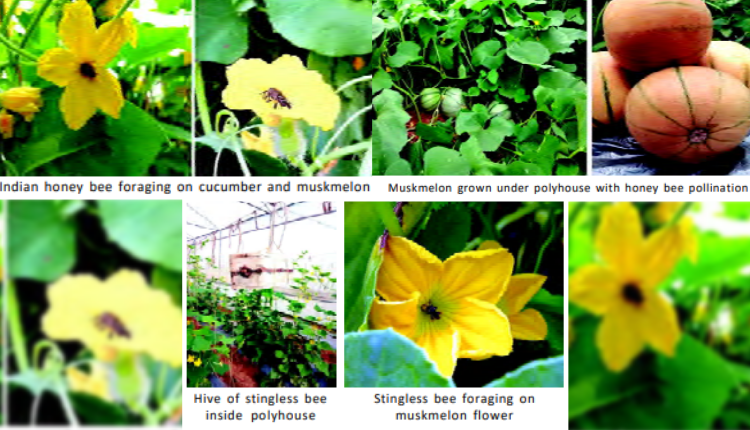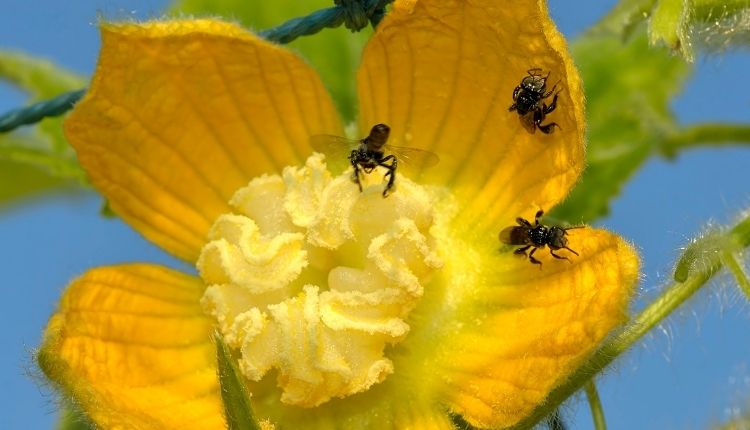Such species of bees were identified which also pollinate in polyhouses
Scientists at Bangalore-based ICAR-Indian Institute of Horticultural Research (IIHR) have found a solution to a major challenge of polyhouse farmers.
Scientists said that if Indian breed ‘Apis cerana’ and stingless bee ‘Tetragonula iridipennis’ are reared in polyhouse, then even in insect proof environment they can get the characteristics and benefits of insect-moth pollination like in open fields. This new technology reduces the cost of cultivation of polyhouse and increases the income.
Polyhouse farming may have many benefits but its challenges are also not less. For example, in polyhouse farming, hand-pollination has to be done to get good yield of fruits and vegetables. Insects and mites are kept out of the protected environment of the polyhouse. The method of getting pollination done by hand is a difficult and laborious task. This also increases the cost of the crop. Whereas in open fields, free insects and moths complete the process of pollination among fruits and vegetables. That is why there is a shortage of such insects and moths in the polyhouse which can give natural pollination gift to the farmers in closed environment like in open fields.
Indian breed and stingless bees are unique
In view of this need of farmers, the Indian Council of Agricultural Research (ICAR) has given the responsibility of finding a solution to the challenge of pollination in polyhouses to the Bangalore-based institute Indian Institute of Horticultural Research (IIHR). During the year 2019-20, the scientists of IIHR conducted a number of experiments by studying the three crop circles in depth. They then decided that if the Indian bred bee ‘Apis cerana’ and the stingless bee ‘Tetragonula iridipennis’ were reared in the polyhouse, the characteristics and benefits of insect-moth pollination could be achieved even in an insect proof environment there. During their experiment, horticulturists at IIHR found that the male and female flowers of melons and cucumbers were visited by worker bees of both species. With this the process of pollination of flowers was completed very well.

How to do beekeeping in polyhouse?
After identifying the breeds of bees suitable for use in the polyhouse, the horticulturists of IIHR also decided the appropriate method or protocol for their use. The advice of scientists for the farmers is that for the success of new technology, the bee box with eight frames and front and back clearance should be kept in the polyhouse at a time when the flowers are about to bloom on the crop.
Hanging the boxes of stingless bee ‘Tetragonula iridipennis’ from the ceiling of the polyhouse also proves to be very useful. To measure the success of their research, the scientists compared the yield of a pollinated crop pollinated by contact with bees with that of a crop that had been hand-pollinated and kept away from insects.

How was the production using beeswax?
After their experiment, the horticulturists found that the average fruit set, number of fruits per plant and weight of cucumber fruit were 88.6%, 21.4 and 375.5 g, respectively, in the case of bee pollinated cucumbers compared to hand pollinated ones. . Whereas in melons the same figure stood at 92.5%, 1.85 and 1.6 kg. That is, roughly the same results as pollination of bees with hands.
What will be the benefit of new recipe?
In this way, the new technology with beeswax saved the labour cost that goes through manual pollination. Also, whatever is the cost of honey and wax etc. obtained from the bee box will be counted as additional income. That is why agricultural scientists have strongly recommended keeping indigenous species of bees for pollination in polyhouses. If any farmer wants more information about this, then he/she should contact ICAR-IIHR. The email address of the Director of this Institute is [email protected].
Contact us: If farmers want to share information or experiences related to farming with us, then they can do this by calling us on the phone number 9599273766 or by writing an email to [email protected] or by sending your recording. Through Kisan of India, we will convey your message to the people, because we believe that if the farmers are advanced then the country is happy.



